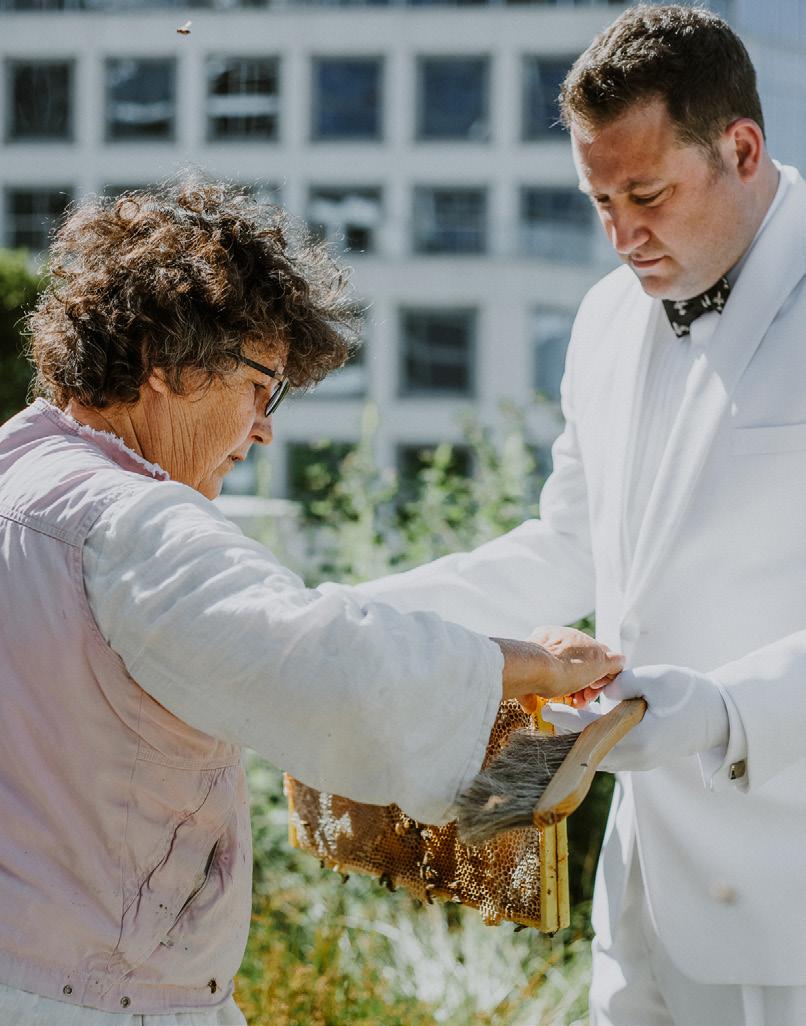
3 minute read
Ethical Travel Report: How Sweet it is, Indeed
Ethical Travel Report: How Sweet it is, Indeed
By Karen Leiva
Wearing a white beekeepers’ hat and veil, my bare hands are gripping a tray with hundreds (maybe thousands) of buzzing bees. It’s quite a rush. Until I feel something crawling on my finger.
My worst fear is not a sting, but rather dropping the tray and sending all these bees into a swarm of confusion. I hold on and take a breath. For such a little insect, they sure do make a big impact – in more ways than one.

FAIRMONT WATERFRONT POLLINATOR ©FAIRMONT HOTELS & RESORTS
There’s been a lot of buzz in recent years about saving the bees, but Fairmont Hotels and Resorts have been providing a haven for bees on their rooftops and in their gardens for more than a decade. There are more than 40 honeybee apiaries and wild bee hotels on Fairmont properties around the world.
Here, at the Fairmont Waterfront in Vancouver, there are approximately 250,000 bees on the rooftop producing a lot of honey – about 200 pounds of it every year. In addition to the honeybee apiary, the rooftop’s pollinator bee hotel is designed to attract, support and protect indigenous bees by giving them a much-needed habitat.

BEE KEEPING ©FAIRMONT HOTELS & RESORTS
The hotel offers tours that are open to the general public and its guests for a chance to see the bees and learn more about them. The tours are led by a member of the hotel’s Bee Team.
So passionate are the staff at Fairmont Waterfront about the bees that they took the project one step further by partnering with expert beekeeper, Julia Common, co-founder of Hives for Humanity, to introduce 27 mason bees houses (these bees are non-stinging and key pollinators) to its garden and across the city.
Hives for Humanity works with people from Vancouver’s Downtown Eastside, one of the poorest areas in Canada. Through Hives for Humanity, the Fairmont Waterfront rooftop garden and hives are currently maintained by people from this neighbourhood. “We have a lot of marginalized people in the Downtown Eastside,” says Kristyna Vogel, Director of Marketing and Public Relations, Fairmont Waterfront.

BEES ©KAREN LEIVA
“Hives for Humanity uses beekeeping and candle making, and all these lessons from around the hive, to help people create a sense of self worth and self esteem. It’s about building skillsets for marginalized people, but mostly it just brings them together. It’s sort of a first step of bringing them back into society.”
After my rooftop hotel tour, my bee experience continues at Fairmont Waterfront’s ARC restaurant with a bee-inspired menu. The seasonal Give Bees a Chance menu includes dishes that focus on foods pollinated by bees (bees are responsible for pollinating one-third of the food we eat).
Look for options like cauliflower steak with a hint of harissa and a side of curried cashew ketchup. Plus, there are desserts like burnt honey ice cream that include honey from the Fairmont Waterfront hives, right off the comb – it really doesn’t get any sweeter than that.

OBSERVATION HIVE ©FAIRMONT HOTELS & RESORTS
#FairmontBuzz Fun facts about Fairmont’s bees
• The Fairmont Empress in Victoria, B.C., is home to 10 colonies with approximately 50,000 bees in each, producing 700 pounds of honey every year.
• In 2011, a record-breaking 800 pounds of honey was harvested from Toronto’s Fairmont Royal York, one of the world’s first hotel rooftop apiary.
• More than 2,500 honeybees have made their homes at the Fairmont Yangcheng Lake in China.
• Bermuda’s bee populations have been dwindling, but Fairmont Southampton hopes to turn that around with the recent introduction of hives.










